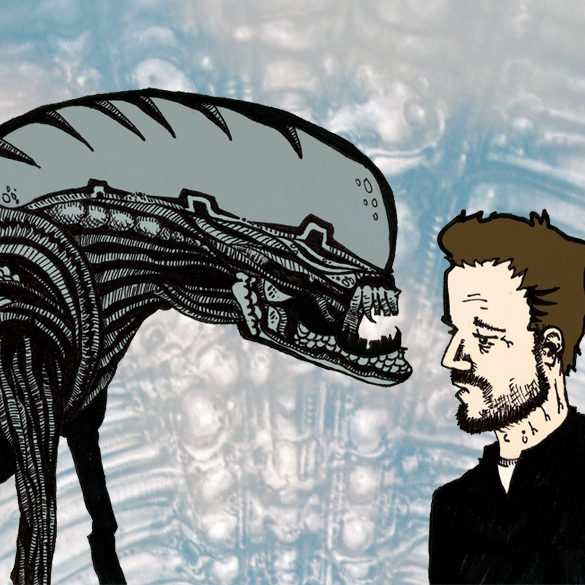This space,
like
a set of lungs,
fills up with air,
which spreads across the
body like two warm hands, from the space into mind
full of half forgotten things, parcels of hollow ideas, movements
of songs and the dreams which you remember occasionally,
a climbing wave,
of the reconciliation
of nature with language, like a ball of string
that can be undone if you pull
in the right place, in a second,
so that many confusions are one,
and there are no longer words, but
feelings,
the feelings of the mind when it vaults out beyond itself and encounters
no resistance
so that it cannot stop
hurtling through the space
which cannot be seen or felt
except maybe we when are three or four
before the language games really begin
and we become knotted up with words,
like a first love that deepens past despair
and then becomes something that
will always be dying,
but never dead,
something that will always be strange, as if fireflies
don’t die in the mornings, but
break apart into pieces of living light
full of the beautiful glooms
of summer, always the same, but inexorably
dimmer and dimmer,
an incongruity between love and time,
the whirls between sleep which
moves us on,
to Wordsworth’s “philosophical mind”
which may or may not come
but is always there in that calm within us that we cannot quite seem to grasp as if
goodness were made of a diffusion
and not a substance,
as if Bethlehem, where I live,
was more than this collection of
middle-aged men mowing lawns,
and Phillies games in the twilight
on TV,
all of these wholly decent things,
which have no end,
but must end, and cannot continue
in perpetual decency and wholeness,
like that summer, two years ago,
when Emily would make that almost Russian black bread
late at night, and we would fry it in garlic
and olive oil
and just talk
about where we were
while our parents slept
in the house where they have always slept,
in the house where, somehow,
my imagination found it’s growth,
as if it were a hearty seed,
clinging to a barren hill,
this simple decency and goodness,
without peculiarities except those which all of us carry around
in our heads, but cannot share,
a series of looping equations that
never cross or can be proven,
to cross but are only probabilities
like whether Emily will choose or not choose
to make bread, whether
the language game will be won or lost,
at a given curve and sudden
drop
in time,
as if the complexity of our garden
was mirrored in the house,
and somehow multiplied in the some pure
unmappable clarity, in the space,
the full stream of inner space,
which can never be isolated,
in it’s perfect purity,
that music which was torn apart,
by the Bacchantes awhile ago,
and occasionally reassembles itself
in one of us, and fills us with sorrow
for the Eurydice
we never even knew,
but feel, somehow, is everywhere, is
always turning into salt before our eyes,
as if Bethlehem was not a series of storefronts
and homes, but a giant resistance
in the space of the self,
always unwilling to
be assimilated into the system of imagination, always reserving for itself
some unimaginable grief,
wave-like in it’s rippling
and spreading,
not memory precisely, but
the muted logic of memory,
the meaning of what memory means,
not just a passing,
but an overcoming of the imagination
that has not been resolved into a unity
and probably cannot be despite our trying,
despite the instances of isolations,
when we seem to grasp the problem,
and shatter all the mirrors so that we see
only the important, single image, not
of a space, but of what is beyond
the space, and feeds it,
from the stream of everything that runs away,
sounds that cannot be arrested,
the dog’s barking, birds, and
the coffeemaker, sudden illuminations of
the being that cannot be repeated
though they always are,
in loops and jangles
of days and nights which hang from us,
like the colorful materials of an expressionist painter, or
an Indian headdress rendered by Dürer,
and every other literalist
of the imagination
which is never literal and has no end,
but the vagaries of doubt
and the ash-heap of dying,
but can stretch itself out and out and out
on laughter, or love-making and
all the other bewilderments of the being
we employ to
get us through life,
to death, or whatever it is:
poetry,
or,
the heart burnt out, but revived by air
exhaled from a giant’s chest,
the fabric of space,
oddly aflutter,
like an angel’s white feathers
as it descends to earth, this
poetry or revival,
this essence of self-creation, which
is created but not contained, and is
just an assemblage of words
which forms it’s own rules
that do not say when the game will end
but only that it is perfectly beautiful,
gathering itself and feeding itself on
a space:
whatever space:
within and around us:
as it
collapses,
and
folds,
and floods:
with the images of life.
Matthew Gasda is a poet living in NYC. He prefers to write his poems in the morning, with a cup of green tea.
